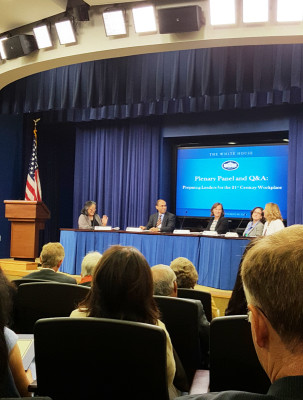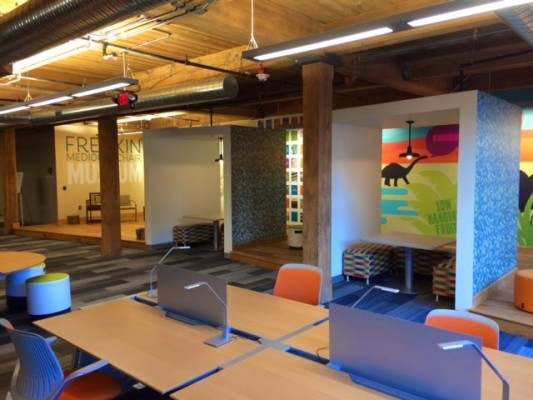When Johnna Beckham, EMBA 39, had the idea to create a business selling custom suits to women online, she approached Ron King, Myron Northrup Professor of Accounting at Olin, for advice and support. King said, “In general, with any new idea, one reacts to it based on the quality of the person and their capabilities and passion—people, project, and passion. In addition to seeing all of that in Johnna, I also saw that the market need for custom-made suits for women was an underserved market.” King ended up investing in and co-founding Johnna Marie with Beckham.
Guest blogger: Tanya Yatzeck, EMBA 43
Even with this support, Beckham found herself looking for additional help. Like most EMBA students and graduates, Beckham had a full-time job to do in addition to developing her entrepreneurial idea into a business and needed help organizing her effort. She found Prosper Women Entrepreneurs, which she says has been critical in her ability to develop the business:

Johnna Beckham
“As a woman entrepreneur, you need like-minded women to gauge where you are. If your execution doesn’t work, you will fail, and it’s helpful to be with other people that have been through it. I did a ton of research through career networks, and then I found the Prosper Mastermind Program. It was the first program I found that had a solid format. It is very structured, which I like.”
Prosper Women Entrepreneurs was created by women business leaders in 2014 to address the entrepreneur gender gap revealed by a Kauffman Foundation report on the state of entrepreneurship. Prosper has numerous initiatives to expand women entrepreneurs’ access to growth capital, educational resources, and networking opportunities.
Beckham is currently participating in one of Prosper’s Mastermind Groups. The two-year training programs involves women entrepreneurs working together to move their businesses forward. The Prosper Startup Accelerator (managed by Olin alumna, Kasey Joyce Grelle, MBA’14), announced in July 2014 is a program that speeds up the growth of a business through access to equity investments among other resources and provides a more intensive three to four month training program offering $50,000 in equity funding. The St. Louis Business Journal recently reported that applications for this program were double what was expected.

Maxine Clark
Maxine Clark, Founder and former Chief Executive Bear at Build-a-Bear was part of the group that founded Prosper Women Entrepreneurs earlier this year. Clark, currently co-teaching the course “Women in Leadership” at Olin, says, “Most of the ideas funded in St. Louis are around technology and agribusiness. Women don’t always come up with those ideas. They want to do products and services. Prosper is a member of the entrepreneurship ecosystem—as is Olin—that provides women with the tools they need to be successful, whether the business is in science, technology or the consumer sector.”

Dr. Mary Jo Gorman.
Dr. Mary Jo Gorman, Founder and CEO of Advanced ICU Care and now Managing Director of Prosper Women Entrepreneurs earned her MBA in 1996 in Olin’s Executive MBA program. She says, “The statistics around women-led companies show that they are not accessing capital. At Prosper Women Entrepreneurs we are trying to create a pipeline of companies that will be terrific candidates for venture capital and at the same time involve women who perhaps haven’t invested before and to get them to start investing at a level that makes them comfortable.”
Gorman also believes that gender-specific resources like Prosper won’t always be necessary. “Our sense of it is at this point in business growth, there still needs to be focused attention to underrepresented groups. In the future, this won’t be necessary. Now, focused attention will help people enter this space, who may not have thought about doing it before if it were in a more gender mixed setting. Women often feel like they have to have everything perfectly, which sometimes appears as lack of confidence. We are trying to make the space feel like more of a safe place that results in a positive experience. “
Since completing her MBA, Gorman has started multiple companies and is a well-established business strategist with particular expertise in the medical field. Of the EMBA experience she says, “When I started my EMBA, I was a doctor with one small company. Without it there is no chance I would be where I am. I learned that I have a strong interest in entrepreneurship, and I wrote a business plan and started a second company while I was in the program. It definitely set me on a path to learn what I needed to learn. I expected it to lead me to healthcare administration, and I ended up in a very different place. “

Prof. Ron King, Director of the Center for Experiential Learning and Myron Northrop Professor of Accounting
When asked about the future of Johnna Marie, Ron King says, “I think the path looks very bright and I think the business model is likely to accomplish its objectives. But businesses are inherently risky. Even if the financial aspirations do not develop as quickly as planned, the process of building a business plan and putting a team together will add to her substantial resume. I’m hoping for the upside, not only for a return on investments –but for her growth and advancement. For the benefit of the St. Louis community and Washington University, there are so many reasons to support and champion efforts like hers. “
Johnna Marie launches in January 2015, and will participate in Olin’s booth at the 10th Annual Business Journal Women’s Conference in downtown St. Louis on January 30.








 After our first class, we were divided into teams and set loose to get started on our projects! My team’s consulting project is for
After our first class, we were divided into teams and set loose to get started on our projects! My team’s consulting project is for 





 Growing up in with a single, working mother, Rhonda Adams planned to go to a college that would offer her a full scholarship because she did not want her mother responsible for her education. She attended Jackson State University with a full ride to study computer science. Rhonda began working for Caterpillar and ended up holding five different roles. She became extremely involved in her work and success, ultimately developing a passion to ensure minorities and women receive opportunities to grow their own businesses. After moving to St. Louis, she became the executive director of Mid-States Minority Supplier Development Council. Her personal insights included:
Growing up in with a single, working mother, Rhonda Adams planned to go to a college that would offer her a full scholarship because she did not want her mother responsible for her education. She attended Jackson State University with a full ride to study computer science. Rhonda began working for Caterpillar and ended up holding five different roles. She became extremely involved in her work and success, ultimately developing a passion to ensure minorities and women receive opportunities to grow their own businesses. After moving to St. Louis, she became the executive director of Mid-States Minority Supplier Development Council. Her personal insights included: